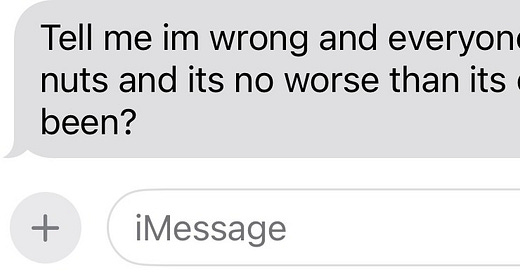Worse than its ever been? Revisit 1972.
Eating dogs and cats? How about fucking goats? Our irreconcilable interiors.
An Ohio friend, fretting about dog-eating migrant conspiracies that had spawned in her state and boomeranged across the country, texted me last week:
I just so happened to be finishing “Nixonland,” Rick Pearlstein’s 748-page epic tome on the turbulent period between 1964 and 1972 detailing Nixon’s steady, relentless climb to power amid an unpopular foreign war, racial strife and embers of violence abound.
So I paused before responding.
While the instinct is to say 2024 is unique or unprecedented due to the disequilibrium caused by one Donald J. Trump — and feverish reactions he inspires — history has a way of curbing your presumptions.
You (likely) know the story of the ‘60s. The assassination of President Kennedy in 1963; President Johnson abandoning his re-election five years later in 1968, the same year different madmen took the lives of Martin Luther King Jr. and presidential candidate Robert F. Kennedy.
Thankfully there hasn’t been a bloodier period of political assassinations since (even when accounting for two recent close calls.)
But as I wound to the crescendo of “Nixonland,” which tracks Nixon’s 1972 re-election, I was struck at how volatile, unstable and fractured the country remained, even during an overlooked campaign that ended up resulting in a landslide that was rarely in question.
A outcome that would look unwise just two years later.
From afar there’s no obvious parallel between 2024 and 1972.
Look closer and you see a through-line on the politics of extremes, with increasingly inflamed rhetoric just as harsh and radical then as it is now.
It served as a reminder of a country with enduring irreconcilable interiors and a underbelly of paranoid barbarity.
On abortion, Democrats were divided amongst themselves about how far to go on reproductive rights and they projected their cleavage vividly.
“If you people had your way, you’d have George support everyone’s right to fuck goats.”
— Shirley MacLaine to Gloria Steinem at the 1972 Democratic National Convention, referring to nominee George McGovern
Outside the ‘72 Republican National Convention, Pearlstein reported that “militants pulled the engine wires to disable the buses of the Mississippi and South Carolina delegations.”
There was more:
“Lunatics lay in front of the Illinois bus, spray-painting its windshield black, slashing its tires, torching an American flag and trying to throw it into the engine."
The scenes makes this year’s pro-Palestinian protests look prostrate.
Pearlstein also sketches a scene from Miami that captures the common-man’s revulsion of Vietnam war protester Jane Fonda.
Two policemen watched her on the news in a bar in Miami Beach: '“Bombing the dikes! Ha! The only dike getting bombed is Fonda!”
Even Oprah hasn’t experienced this type of backlash.
Fears of the Deep State aren’t new — and shouldn’t be.
J. Edgar Hoover’s FBI categorized certain celebrities as a security risk “potentially violently dangerous to the U.S. government. The names on a




